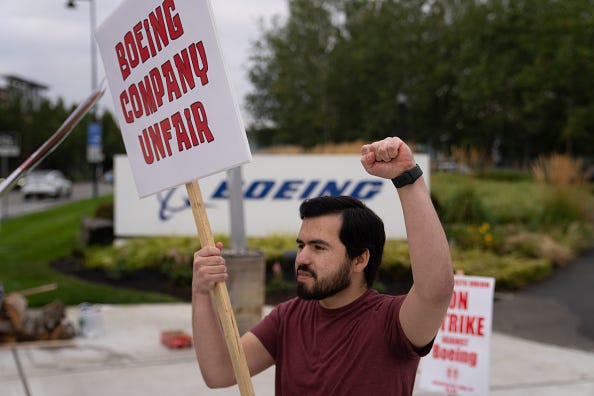
A tentative agreement has been reached between Boeing and the almost 33,000 machinists who have been striking for the last month after the two sides failed to finalize a new labor contract in September.
The news was shared by the International Association of Machinists, the union representing the workers, in a social media post on Saturday morning.
“We are finalizing the strike settlement agreement, which will be completed soon, along with additional contract details to provide you with a clear understanding of the offer,” the union said in its post.
Before the workers started their strike, they shot down a “final” deal many had said was the best it had ever offered. That offer was for a four-year deal that included raises of at least 25%, an immediate 11% pay hike, cost-of-living increases, increased contributions to 401(k) accounts, and lower health insurance premiums.
However, 96% of the union’s members voted to strike down that deal, instead pushing for a 40% raise over four years, among other benefits.
But now it appears the two sides have found middle ground as the company has offered the machinists a deal that includes a 35% wage increase over four years, an incentive pay plan that has a guaranteed minimum annual payout of 4%, and increased contributions to 401(k) accounts, the union shared.
Missing from the deal is the restoration of a pension plan that was in place decades ago, CNN reported
“The fact the company has put forward an improved proposal is a testament to the resolve and dedication of the frontline workers who’ve been on strike – and to the strong support they have received from so many,” IAM said in a press release.
While the strike is on pause, it’s not officially over, as IAM says its workers will have to “ultimately decide if this specific proposal is sufficient.”
“Like many workers in America, IAM members at Boeing have sacrificed greatly for their employer, including during the pandemic when these workers were reporting to the factory as executives stayed at home,” they wrote. “These workers deserve to have all of those sacrifices recognized.”
After the work stoppage began, Boeing enacted several measures to save costs, not looking to repeat the 8-week strike in2008 that resulted in a loss of $1.2 billion in net income. Among its cost-saving efforts was the furlough of tens of thousands of workers, a hiring freeze, a reduction to executive level pay, and most recently, the elimination of 10% of its workforce.
The union’s members will vote on the latest contract negotiations in the coming week.
